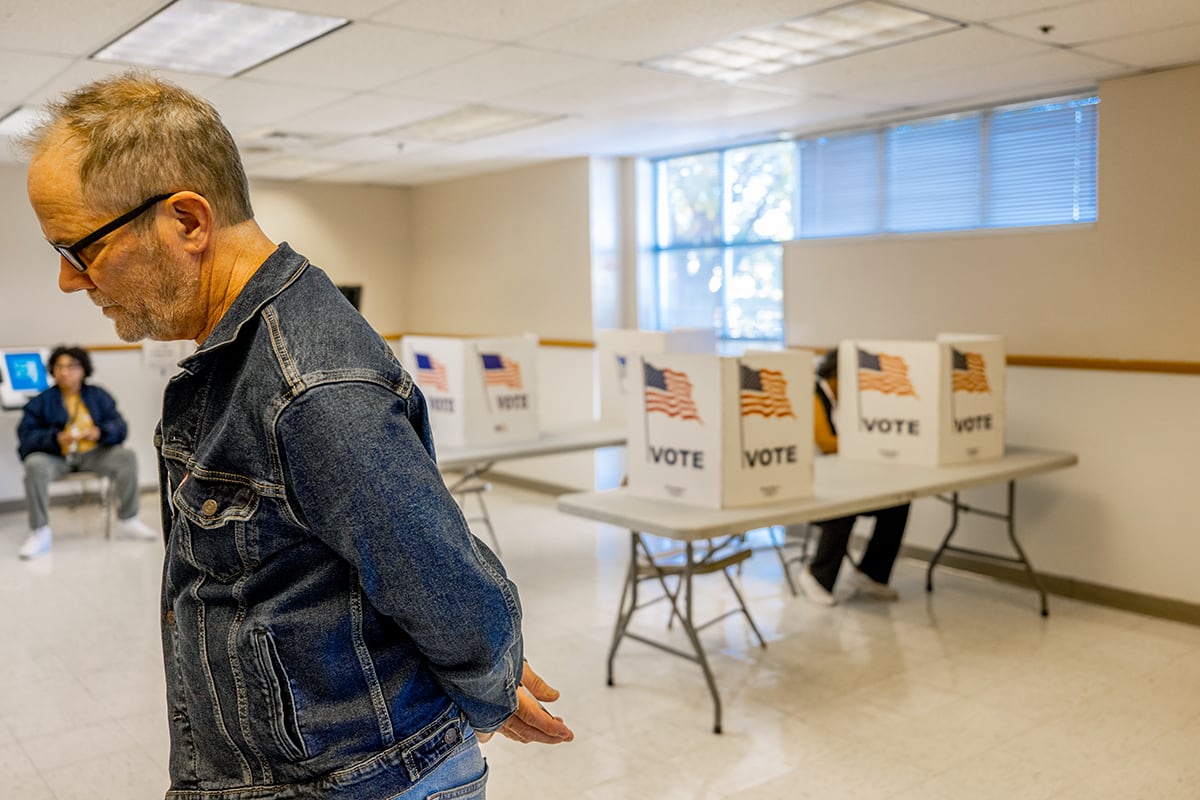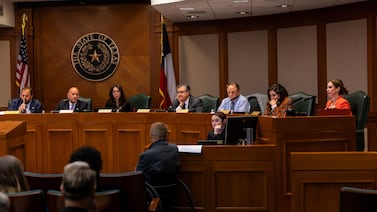Votebeat is a nonprofit news organization reporting on voting access and election administration across the U.S. A version of this post was originally distributed in Votebeat’s free weekly newsletter. Sign up to get it delivered to your inbox every Saturday.
Hi, y’all,
It’s not even 2024 yet (though, how is it DECEMBER RIGHT NOW?), but the headlines are screaming about how everyone will be screaming this time next year:
- Politico: Voting machine trouble in Pennsylvania county triggers alarm ahead of 2024
- NorthJersey.com: ‘Perfect storm’: Can Bergen County fix its voting troubles in time for the 2024 election?
- Facing South: Election disruptions and barriers in Southern states point to challenges for 2024
Woof, guys. Woof. And the subtext of all of this is artfully contained in this BBC headline: “Election Day 2023: Local problems fuel baseless ‘fraud’ allegations.”
Abe Hamadeh — the Republican who narrowly lost a race for attorney general in Arizona — is among those pushing the narrative. He’s tweeted about errors in Pennsylvania and elsewhere, using software programming glitches to justify his claims of mass fraud and error. His “War Room” tweeted about growing mistrust.
There has been a bright spotlight shining on county election administration since 2016, but it is arguably only growing brighter. In Pennsylvania, Northampton County Executive Lamont McClure did an interview with Politico after his county experienced widespread ballot-printing errors on election day. “We’re at the peak of mistrust of one another, but until that subsides, counties like ours need to be nearly perfect,” he said.
Related news: Northampton’s Director of Administration Charles M. Dertinger — responsible for administering elections in the county — resigned last week. In a statement about his resignation, McClure specifically noted the election problems this year and in 2019, which also happened under Dertinger’s watch.
Counties affected by errors have responded with varying degrees of effectiveness. Northampton’s response to the errors — though the errors were avoidable and unfortunate — was prompt and, more or less, clarifying. The county still has a ways to go in rebuilding trust, but this is a start.
On the other end of the spectrum, consider Hinds County, Mississippi, — home to Jackson — which we wrote about last month.
There, as early as 9 a.m. in some places, polling locations ran out of ballots. That’s really a shocking thing to write, even this many days later, especially because so far Hinds County has provided pretty shoddy explanations for what happened:
WJTV in Jackson reported that the county took full responsibility for the problems, and that “the cause of the issue may be due to the Legislature redistricting Hinds County.” May! Local officials told the news outlet that smaller precincts received an excess of ballots while larger ones received too few.
Local Commissioner Shirley Varnado then offered the following, “When we did the primary, we called [the secretary of state] to ask, ‘How do you do splits when there are new splits?’ And we’ve never had the splits before. Normally when you have splits, you go by the previous elections that have been held in the past. This was all new.”
There was no additional information offered, and Varnado’s comments do not provide a lot of confidence that the commissioners fully understand the nature of the problem. Varnado said the county “hopes to receive some assistance or a step-by-step guide from the Mississippi Secretary of State’s Office” so the problem doesn’t repeat itself, though not a single other county in Mississippi had similar problems.
Carrie Levine, Votebeat’s story editor, sent records requests to Hinds County hoping for more clarity. None has come. We are more confused now than we were when we sent the requests.
The law requires both the elections office and the county’s circuit clerk to have copies of “the receipts signed by each Hinds County precinct’s receiving manager stating the number of ballots distributed to that manager.” So, we requested the receipts for the election held on Nov. 7.
The circuit clerk confirmed he is not in possession of any such records.
We sent a request for the same record to each of the county election commissioners responsible for carrying out elections — as well as a request for the certificate stating the number of ballots printed for each precinct and documents showing the “accounting of delivered ballots,” both of which are required to be kept by law. Those requests have yet to even be acknowledged.
Mississippi law requires that records requests be responded to within 14 days of their receipt, and — at the time that this newsletter hits your inbox — 15 business days have passed. Nothing.
It’s fair to say this is not an effective response after what local news called “a ballot fiasco.”
Without a fulsome explanation by these officials, it would be understandable for voters in Jackson to lose trust in their local officials. Officials can and should avoid that. Especially when the pressure on elections next year means there’s almost no room for error.
We’re preparing to cover the 2024 elections next year. What issues in voting should we focus on? What’s missing in election news? Help us decide what to cover by filling out our survey here.
Back Then
For this week’s history, a sampling of historical uses of the phrase “ballot fiasco,” which is surprisingly common:
- First, the Herald-News out of Passaic, New Jersey, in 1967, when the Bergen County clerk had a few things to say about the design of the ballot: “Allan Suggests Legislature Act to Avoid Ballot Fiasco.”
- Then in 2001, a slightly lighter note from the Modesto Bee, when “city hall engineers groaned extra loud” as errors from a recent all-mail election in Modesto came to light — they were hoping to do their own mailed-vote in the coming weeks: “Storm-drain issue has bad timing after ballot fiasco.”
- Next up, the Clarion-Ledger in 2012, which ran an opinion about none other than Hinds County: “Absentee Ballot Fiasco: Clark should resign election commission post.”
- Finally, from the Associated Press last May, an examination of the Clackamas, Oregon clerk’s history of errors: “Oregon ballot fiasco highlights ‘invisible’ election chiefs.”
New From Votebeat
From Votebeat Arizona: Two Cochise County supervisors indicted for refusing to certify midterm election
From Votebeat Arizona: Arizona county again rejects proposal to hand-count ballots in 2024
From Votebeat Michigan: Michigan to automatically register people to vote when exiting prison
From Votebeat Pennsylvania: Court ruling on undated ballots brings confusion as counties certify November election results
From Votebeat Pennsylvania: Pa. counties must accept undated, incorrectly dated mail ballots, federal court rules
From Votebeat Texas: Harris County election shows progress. But challenges remain ahead of 2024.
From Votebeat Texas: Tax cuts, teacher pension increases at stake after misinformation-led challenge to 2023 election
In Other Voting News
- In a closely watched ruling that upends decades of precedent under the federal Voting Rights Act, a federal appeals court ruled private plaintiffs cannot bring cases under a key section of the law, the Associated Press reported. The decision is almost certain to be appealed to the U.S. Supreme Court. In addition, the judges of the U.S. Court of Appeals for the 5th Circuit will meet en banc to reconsider a decades-old precedent allowing voters of different races to challenge political maps as a coalition class.
- Harris County, Texas’ largest, has dropped its legal challenge to a state law forcing the dissolution of its election office, saying it was moot since the county was forced to comply with the law in time for the 2023 election, the Houston Chronicle reported. Votebeat reported the county pulled off a smooth election in 2023, but still faces challenges before next year’s high-turnout presidential election.
- Arizona Republican lawmakers must sit for depositions and provide records in a lawsuit over two voting laws after the Supreme Court rejected their motion for an emergency stay, the Arizona Republic reported. The laws would create new checks on voters’ citizenship, and plaintiffs sought lawmakers’ testimony to determine whether they had discriminatory intent when they passed the new statutes.
- A Northampton County official resigned in the wake of election problems in the county this year, PennLive reported, after a programming error led the county’s voting machines to produce printouts that incorrectly reflected some voters’ choices in two judicial races, though election officials stressed the machines correctly recorded the votes.
- The head of Florida’s election fraud office, former Broward County elections official Peter Antonacci, lay dying in the hallway outside the governor’s office for 24 minutes before anyone provided assistance, the Florida Bulldog reported, citing new records and reporting Antonacci abruptly exited a meeting in a nearby conference room before collapsing in the hallway.
Jessica Huseman is Votebeat’s editorial director and is based in Dallas. Contact Jessica at jhuseman@votebeat.org.






